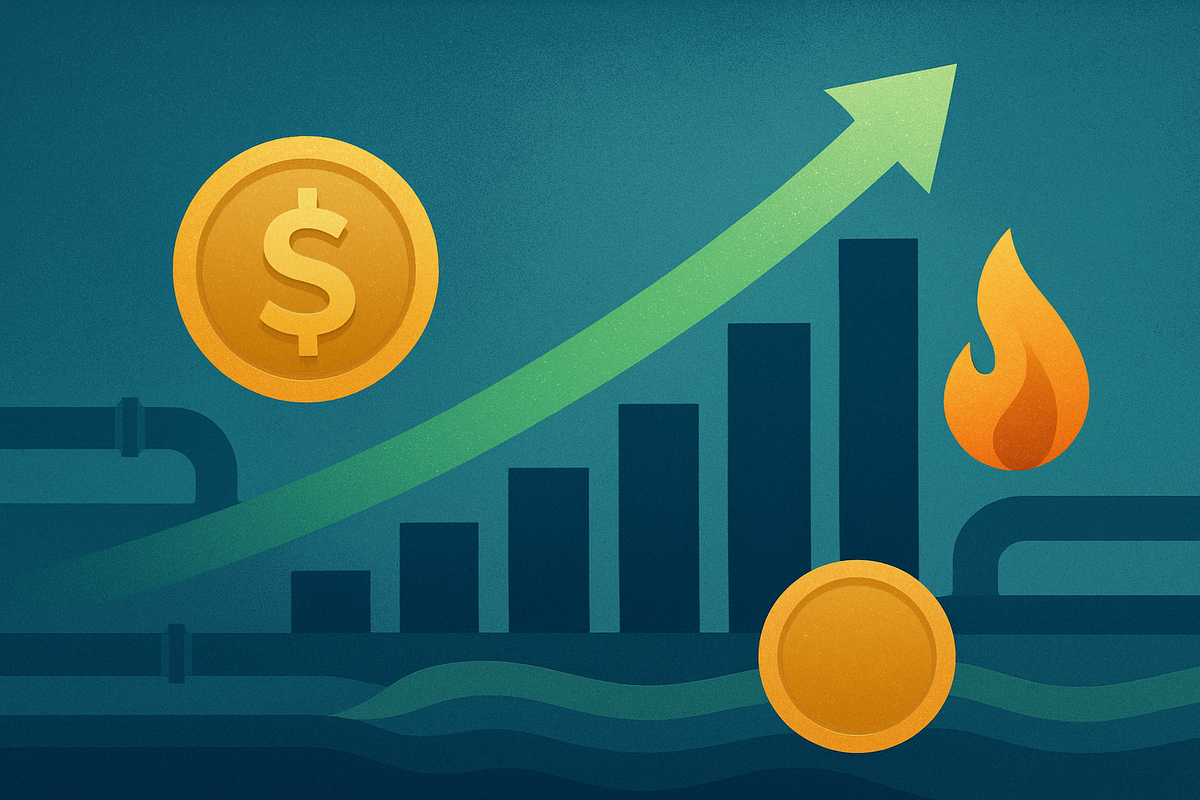Gulfport Energy Doubles Down on Shareholder Returns with Expanded Buyback Program

Gulfport Energy (NYSE: GPOR) has significantly amplified its commitment to shareholder returns, announcing a substantial expansion of its share repurchase program for both 2025 and 2026. The move, which sees the company's total authorization balloon to $1.5 billion through the end of 2026, signals a robust financial position and a clear strategic preference for returning capital to investors. This aggressive capital allocation strategy is poised to reshape the company's financial metrics and could set a precedent for other players in the upstream energy sector.
For the fiscal year 2025, Gulfport Energy projects to allocate approximately $325 million to common stock repurchases, with an incremental $125 million planned for the fourth quarter alone. Looking ahead to 2026, the company has further increased its forecast for share repurchases to an impressive $350 million. This ongoing and escalating program underscores management's confidence in the intrinsic value of its equity and its disciplined approach to capital deployment, even as the broader market navigates volatile energy prices.
A Deeper Dive into Gulfport's Repurchase Strategy
The latest expansion, authorized by Gulfport Energy's Board of Directors on August 5, 2025, brings the total stock repurchase authorization to $1.5 billion, extending through December 31, 2026. This represents a 50% increase from the prior $1.0 billion authorization set in November 2024, which itself was an expansion of the program initiated in March 2022. As of September 30, 2025, the company had already deployed approximately $785 million to repurchase 6.7 million shares since the program's inception.
Gulfport's rationale behind this aggressive buyback strategy is multi-faceted. Primarily, it reinforces the company's commitment to returning capital to shareholders, with management explicitly stating an intent to return substantially all adjusted free cash flow, excluding discretionary acreage acquisitions, through repurchases. A significant driver for the expansion was also to facilitate the opportunistic redemption of all outstanding shares of Series A Convertible Preferred Stock, a move that simplifies the company's capital structure and accelerates common share retirements. Furthermore, the program demonstrates management's confidence in the attractive value proposition of Gulfport's equity, aiming to enhance financial flexibility and improve per-share metrics.
Initial market reactions have been largely positive, with analysts highlighting the initiative's potential to boost shareholder returns and improve financial flexibility by reducing the share count. Simply Wall St, as of November 21, 2025, noted that the program supports per-share metrics and strengthens the investment case for near-term shareholder value. Investing.com also observed improved analyst outlooks throughout 2025, with consistent "Overweight" ratings. However, some cautionary notes have emerged; Seeking Alpha (August 9, 2025) pointed out that the preferred share redemption, while beneficial long-term, might temporarily push Gulfport's leverage above its 1.0x target, though it is expected to normalize by late 2025 to early 2026. Analyst ratings remain somewhat mixed, with some maintaining "Buy" ratings and high price targets, while TipRanks' AI Analyst "Spark" rated GPOR as "Neutral," citing profitability challenges and valuation concerns despite positive operational improvements.
Implications for Gulfport and its Peers
For Gulfport Energy (NYSE: GPOR) itself, this expanded repurchase program is a clear signal of financial strength and a strategic lever to enhance shareholder value. By reducing the number of outstanding shares, the company is poised to improve key per-share metrics such as earnings per share (EPS), free cash flow per share, and return on equity. This can make the stock more attractive to investors, potentially driving share price appreciation. The redemption of preferred stock also streamlines the capital structure, reducing complexity and potentially lowering the cost of capital in the long run. This move effectively acts as a significant investment in its own business, signaling management's belief that its shares are undervalued.
The impact on competitors in the upstream natural gas sector, such as EQT Corporation (NYSE: EQT), Chesapeake Energy Corporation (NASDAQ: CHK), and Antero Resources (NYSE: AR), could be varied. While Gulfport's move highlights a strong balance sheet and commitment to shareholder returns, it might also put pressure on peers to demonstrate similar capital allocation strategies, especially if they are generating substantial free cash flow. Companies with less robust financial health or higher debt burdens might find it challenging to match such aggressive buyback programs, potentially making Gulfport a more appealing investment in the eyes of some investors focused on capital returns. Conversely, if competitors choose to reinvest heavily in production growth, it could lead to increased supply, which might affect natural gas prices and, by extension, the profitability of all players in the sector.
Broader Industry Trends and Future Outlook
Gulfport's expanded share repurchase program fits squarely within a broader industry trend among U.S. energy producers, particularly in the natural gas sector, to prioritize shareholder returns over aggressive production growth. Following years of "drill baby drill" mentalities that often led to oversupply and depressed prices, many companies are now adopting more disciplined capital allocation frameworks. This often involves channeling free cash flow into debt reduction, dividends, and, increasingly, share buybacks. This shift reflects investor demand for greater capital efficiency and a focus on profitability rather than sheer volume.
The potential ripple effects could extend beyond direct competitors. Service providers to the upstream sector might see a more stable, albeit potentially slower, demand for their services if capital is diverted from drilling into buybacks. Regulatory or policy implications are less direct, as share buybacks are generally a corporate finance decision, but a sustained trend of reduced capital expenditure in favor of returns could draw attention from policymakers concerned about long-term energy supply stability, although this is a less immediate concern. Historically, periods of strong commodity prices often lead to increased buybacks, but Gulfport's move, even amidst fluctuating natural gas markets, underscores a deeply embedded strategy. This mirrors similar trends seen in the oil sector where major players like ExxonMobil (NYSE: XOM) and Chevron (NYSE: CVX) have also committed significant capital to buyback programs.
What Comes Next for Gulfport Energy
In the short term, investors will be closely watching Gulfport Energy's execution of its expanded repurchase program, particularly the $125 million incremental allocation in Q4 2025. Successful deployment of these funds, coupled with continued strong operational performance, could further bolster investor confidence and potentially lead to upward revisions in analyst price targets. The company's progress in reducing its leverage back to its target of 1.0x following the preferred stock redemption will also be a key metric.
Looking further ahead, the $350 million allocation for 2026 suggests a sustained commitment to this strategy. Potential strategic pivots might include further capital structure optimization or even a re-evaluation of its dividend policy if free cash flow continues to exceed repurchase targets. Market opportunities could emerge if Gulfport's enhanced financial metrics and reduced share count lead to a re-rating of its stock, attracting a broader base of institutional investors. Challenges might arise from significant downturns in natural gas prices, which could impact free cash flow generation and the feasibility of maintaining such an aggressive repurchase pace. Potential scenarios range from continued outperformance driven by disciplined capital management to a scenario where broader market volatility or operational setbacks temper the benefits of the buyback program.
A Resolute Path Towards Shareholder Value
Gulfport Energy's decision to substantially expand its share repurchase program for 2025 and 2026 marks a pivotal moment in its financial strategy, solidifying its position as a company deeply committed to returning value to its shareholders. The $1.5 billion authorization is a testament to its robust financial health and a strategic choice to enhance per-share metrics and simplify its capital structure.
Moving forward, the market will assess Gulfport's ability to consistently generate the free cash flow necessary to fund these ambitious repurchases while maintaining operational efficiency and managing its debt profile. Investors should closely monitor quarterly earnings reports for updates on repurchase activity, free cash flow generation, and any shifts in the company's leverage. This aggressive buyback strategy positions Gulfport Energy (NYSE: GPOR) as a compelling case study in disciplined capital allocation within the energy sector, offering a clear blueprint for how companies can create value beyond mere production growth.
This content is intended for informational purposes only and is not financial advice
More News
View MoreRecent Quotes
View More
Quotes delayed at least 20 minutes.
By accessing this page, you agree to the Privacy Policy and Terms Of Service.




